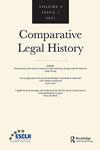市场交换:基于交换的法律经济理论
IF 0.5
Q2 LAW
引用次数: 1
摘要
不受法律现代性所固有概念不可避免的叙事语境的影响。尽管如此,考虑到她所陈述的解释学选择,作者很清楚这一点(21-27)。总的来说,Ulrike Müßig的书在当代法律史学的一条富有成果的道路上开辟了一条独创的道路:回顾过去,特别关注当前的法律机制。只要它没有忽视这一不可或缺的历史敏感性,也没有对其来源强加任何强制性的解读,这种类型的调查肯定会产生有趣的结果,这无疑会引发讨论,从而推进研究。希望这本书将开启一场关于比较历史法律研究方法和目的的国际辩论,因为作者的宪法主义背景使她能够从一个新的角度来阐述经典问题。在欧洲司法史的背景下,这项研究无疑很有意思,它重振了各种方法,丰富了辩论,在一个比较层面上运作,试图梳理出一个共同的视角,即:欧洲对保护标准相对于司法独立的具体敏感性。作为千禧一代发展的成果,在公正和独立的法官面前庆祝的公平和理性审判的保障,决不能被视为免受攻击和误解。这就是本书中的警告:“公平审判”的保障象征性地提供给每个公民,作为一项宝贵的辩护权利,并构成解释现行法律不可或缺的跨国框架。本文章由计算机程序翻译,如有差异,请以英文原文为准。
Marktaustausch: Grundlegung einer juristisch-ökonomischen Theorie des Austauschverkehrs
immune to the inevitable atemporal contextualisation of the notions inherent to legal modernity. Nonetheless, the author is well aware of this, considering her stated hermeneutic choices (21–27). As a general matter, Ulrike Müßig’s book blazes an original trail along a fruitful path of contemporary legal historiography: the past is revisited in the light of the present day, paying particular attention to current legal mechanisms. Provided that it does not lose sight of that indispensable historical sensitivity and does not impose any forced readings on its sources, this type of enquiry certainly leads to interesting results, which will undoubtedly spark discussion and thus carry forward research. It is to be hoped that this book will open up an international debate into the methods and purposes of comparative historical legal research, as the author’s background as a constitutionalist enables her to illustrate classical issues from a fresh perspective. The study is certainly intriguing within a European context of history of justice in reinvigorating approaches and enriching debates, operating within a comparative dimension that seeks to tease out a common perspective, namely: specific European sensitivity for standards of protection vis-a-vis judicial independence. Being the fruit of a millennial evolution, the guarantees of a fair and rational trial, celebrated before an impartial and independent judge, must not be considered to be immune to attacks and misunderstandings. And this is the warning that transpires through the pages of this book: the guarantees of a ‘fair trial’ are symbolically provided to each citizen as a precious right to be defended, and constitute an indispensable transnational framework for interpreting current laws.
求助全文
通过发布文献求助,成功后即可免费获取论文全文。
去求助
来源期刊
CiteScore
1.70
自引率
0.00%
发文量
20
期刊介绍:
Comparative Legal History is an international and comparative review of law and history. Articles will explore both ''internal'' legal history (doctrinal and disciplinary developments in the law) and ''external'' legal history (legal ideas and institutions in wider contexts). Rooted in the complexity of the various Western legal traditions worldwide, the journal will also investigate other laws and customs from around the globe. Comparisons may be either temporal or geographical and both legal and other law-like normative traditions will be considered. Scholarship on comparative and trans-national historiography, including trans-disciplinary approaches, is particularly welcome.

 求助内容:
求助内容: 应助结果提醒方式:
应助结果提醒方式:


